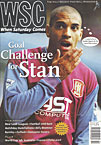 Constantly changing the rules makes things difficult for everybody, not least the referees
Constantly changing the rules makes things difficult for everybody, not least the referees
Watching Nigel Martyn take an eternity over a goalkick the other day prompted thoughts about the Law of Unintended Consequences. Some years ago the tidy-minded people on FIFA’s rule-making committee decided that one of their minor rules was unnecessarily holding up play. It was the one that said a goalkick must be taken from whichever side of the goal the ball went out of play.
This caused small hold-ups if the ball happened to rebound to the other side of goal, or brief bouts of crude sign language between the goalkeeper and the referee if a shot went pretty much straight over the middle of the crossbar. In their innocence, the law-givers decided to abolish the rule to eliminate these annoying delays.
Except that what happens now is that the crafty goalkeepers whose team is holding out for a point or a narrow win (or even a 5-0 win if you’re Peter Schmeichel) routinely collect the ball and amble across the goal to take the kick from whichever side will use up the most time. Since referees apparently prefer to make a name for themselves by adding on nine minutes of stoppage time, rather than clamping down on timewasting at source, the practice goes unpunished and the law change has exactly the opposite effect from that intended.
A similar pattern of events has emerged to frustrate the change in the backpass law and the new (but unimposed) rule that says goalkeepers may only hold the ball for “five or six seconds”. It used to be that keepers would repeatedly bounce the ball while surveying the field through narrowed eye and squeezing the last remaining flavour from that stick of Juicy Fruit before settling on hoofing the ball in the general direction of the talismanic centre forward.
Now the goalie prefers not to handle the ball at all, instead cumbersomely dribbling towards the halfway line until an opponent trots half-heartedly towards him and the keeper opts to hoof the ball downfield in the general direction of the totemic striker.
It is hard to imagine that a regular display of rusty ball skills from a goalkeeper is quite the increase in entertainment value Sepp Blatter and his busy gnome helpers had in mind when they implemented the new law (though if the keeper was dressed as an ogre and made to carry a massive plate of jelly…).
And what, while we’re on the subject of unenforced rules, has become of the rigid FIFA edict that players treated by the physio must leave the field before they resume? Some referees appear to play the rule, some of the time, possibly depending on whether an unneeded stretcher is brought on to the pitch, while others don’t.
The list goes on – goalkeepers moving on the line for penalties, attackers level with the last defender not offside – and while changes like the backpass rule have undoubtedly made the game quicker (though not necessarily better) the most obvious result of their accumulated impact is the creation of dozens more potential flashpoints in a match as players and fans work themselves into a lather over inconsistent or simply baffling interpretations.
Referees, you would think, have got more than enough things to worry about now that their every decision is scrutinised by TV, without having to cope with minor rule changes every season.
And in a World Cup year, you can guarantee that Sepp Blatter, that tireless scourge of tackling from any direction, will have some more insane wheezes up his sleeve before the Summer. (It is worth noting that after the European Championships of 1992 then French manager and now World Cup organiser Michel Platini observed that “tackling is ruining football”. Though it might equally be said that lack of tackling has destroyed basketball.)
Probably they will take the form of edicts to the refs to stamp out such anti-social behaviour as having your shirt hanging out or wearing a ponytail and surely there can be no place for spitting in a primetime family entertainment show such as the World Cup?
Most likely they will lead not to a reduction in foul play, but to crowds and players baying for justice after every bad tackle and waving imaginary cards at the referee, leading inevitably to laughable dismissals of the type that cut short the contributions of players like Gianfranco Zola and Marco Etcheverry at USA ’94.
And after the Summer madness is over, chances are we’ll start the new season with some more needless meddling, to the rapturous delight of Jimmy Hill and the annoyance of everyone else. We wouldn’t want to tempt fate by suggesting what they will be, but you can bet they will result in more indirect free-kicks in the penalty area and a lot of unseemly pushing and shoving. Perhaps flashpoints are what FIFA want though. After all outbursts of foul temper from players seem popular with tennis crowds and fighting bet-ween ice hockey players is positively encouraged. Football may yet fill the gap left by the demise of all-in wrestling.
For rule-makers faced with a possible change or new interpretation the guidance should be the same as for goalkeepers on the introduction of the backpass rule: if in doubt, boot it out.
From WSC 132 February 1998. What was happening this month